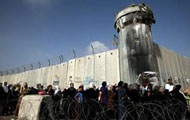
On Wednesday, November 30, the Israeli government decided to transfer the approximately $100 million in tax and customs payments to the Palestinian Authority it has withheld for four weeks. Subsequently, the funds were released the next day. In agreement with the PA and in accordance with the Oslo agreement, Palestinian taxes are transferred from Israel on a monthly basis. On November 1, Israel froze the transfers as a reaction to Palestine becoming a member of UNESCO. The reasoning of the Israeli government to withhold the money for four weeks has been the Palestinians’ membership pursuits at the United Nations and the recent reconciliation efforts between Fatah and Hamas.
Over the past few weeks the Israeli government has been under strong US and international pressure to yield the money. Although Israeli Prime Minister Benjamin Netanyahu eventually proposed that the money be released, he was strongly opposed by Foreign Minister Avigdor Lieberman.
The Palestinian tax and customs revenues collected by Israel make up a large part of the PA’s operating budget. With Israel withholding this money Palestinian Prime Minister Salam Fayyad warned that the PA could not pay November salaries to about 150,000 employees and that they were nearing the brink of a financial collapse. With the release of the funds, however, the government salaries will be paid on time, a PA spokesman announced on Friday, December 2.
On Monday, November 28, Palestine’s ambassador to the UN, Riyad Mansour, said that the PA has not yet decided whether to pursue full membership at the UN in the Security Council. Further he told the Voice of Palestine that if new changes and indicators of support take place, a request will be sent to the Security Council immediately, asking for a new vote.
President Mahmoud Abbas recently provided the Middle East Quartet with a new proposal on the borders of a future Palestinian state. The proposal included the border and security arrangements that Israel would be provided in a peace agreement and the Quartet has demanded that Netanyahu provide a counter proposal, something the Israeli Prime Minister has refused to do.
On Wednesday, November 30, the UN General Assembly passed a series of resolutions addressing core issues in the conflict between Israel and the Arab world. The resolutions criticize the building of Israeli settlements on occupied Palestinian land, back a return to negotiations and express support for UN bodies working on the issue. Seven countries, including Israel and the US voted against each of the resolutions. According to Ma’an news agency, the US delegate said the assembly "repeatedly singled out Israel without fully acknowledging the responsibility of both sides." On the other hand, the Palestinian representative called the resolutions a "loud assertion of truth," which would not obstruct any peace talks.
Following last week’s reconciliation talks with Hamas chief Khalid Mashaal, President Abbas stated on Monday that if all goes well, elections will be held on May 4, 2012. He stressed that the interim government, paving the way for parliamentary and presidential elections, will not be dominated by either side. Calling for a new era of “partnership”, Abbas and Mashaal said they would put together a temporary cabinet of independents and also pledge to resolve the issue of political prisoners “within days”. Both Fatah and Hamas have submitted lists of detainees to be released and the parties will soon agree on a date for a simultaneous release. Further, Abbas is to visit Gaza after the reconciliation agreement with Hamas is put into effect.
In Gaza, the Hamas-run Interior Ministry has fired 120 employees suspected of abusing their positions. According to ministry spokesman Shahwan the dismissals were in line with the de facto government’s promise to fight corruption. He said the employees had been given several warnings for multiple offences and that all allegations against them had been investigated before finalizing the dismissals.
Last Saturday, November 26, Israel warned they would cut the supply of water and electricity to the Gaza Strip, if Fatah and Hamas agreed to form a unity government. On Monday the energy authority in the Gaza Strip accused Israel of deliberately disconnecting the main electricity grid as part of the punitive policy. On Wednesday, November 30, Israel refused to allow technicians to repair the main power line that had been down for 13 days.
After five years of court battles, the village of Qalandiya will again be attached with Jerusalem as Israel’s Supreme Court ruled on Wednesday that West Bank authorities should construct a checkpoint for pedestrians and cars at the entrance of the village. In 2006 the Israeli Ministry of Defense refused to establish a checkpoint in the area that would allow people to get to their lands or to Jerusalem. Since then the village has been closed by a temporary barrier, measures that were appealed by the village council of Qalandiya, resulting in Wednesday’s ruling.






